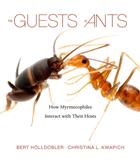The Guests of Ants: How Myrmecophiles Interact with Their Hosts
- Publisher : Belknap Press
- Illustrations : 205 col photos, 16 col illus
Our customers have not yet submitted a review for this title - click here to be the first to write a review
Description:
A fascinating examination of socially parasitic invaders, from butterflies to bacteria, that survive and thrive by exploiting the communication systems of ant colonies.
Down below, on sidewalks, in fallen leaves, and across the forest floor, a covert invasion is taking place. Ant colonies, revered and studied for their complex collective behaviors, are being infiltrated by tiny organisms called myrmecophiles. Using incredibly sophisticated tactics, various species of butterflies, beetles, crickets, spiders, fungi, and bacteria insert themselves into ant colonies and decode the colonies' communication system. Once able to speak the language, these outsiders can masquerade as ants. Suddenly colony members can no longer distinguish friend from foe.
Pulitzer Prize-winning author and biologist Bert Hölldobler and behavioral ecologist Christina L. Kwapich explore this remarkable phenomenon, showing how myrmecophiles manage their feat of code-breaking and go on to exploit colony resources. Some myrmecophiles slip themselves into their hosts' food sharing system, stealing liquid nutrition normally exchanged between ant nestmates. Other intruders use specialized organs and glandular secretions to entice ants or calm their aggression. Guiding readers through key experiments and observations, Hoelldobler and Kwapich reveal a universe of behavioral mechanisms by which myrmecophiles turn ants into unwilling servants.
As this book makes clear, symbiosis in ant societies can sometimes be mutualistic, but, in most cases, these foreign intruders exhibit amazingly diverse modes of parasitism. Like other unwelcome guests, many of these myrmecophiles both disrupt and depend on their host, making for an uneasy coexistence that nonetheless plays an important role in the balance of nature.
You may also like...
Schmetterlinge: Die Tagfalter und Widderchen Deutschlands
Settele, J.; Steiner, R,; Reinhardt, R.; Feldmann, R.; Hermann, G.; Musche, M.; Kühn, E.; Brehm, G.
Price £22.00
Guide to the Butterflies of the Palearctic Region: Hesperiidae 2: Subfamilies
Chiba, H.; Tsukiyama, H.; Bozano, G.C.
Price £32.00
The Vespoid Wasps (Tiphiidae, Mutillidae, Sapygidae, Scoliidae and Vespidae) of
Archer, M.E.
Price £49.90
Hymenoptera: The Natural History and Diversity of Wasps, Bees and Ants
Marshall, S.A.
Price £65.00
(Save £10.00)





![Suomen verkkosiipiset [Finnish Neuroptera]](/ProductImage.aspx?File=26872.jpg&Size=60)







